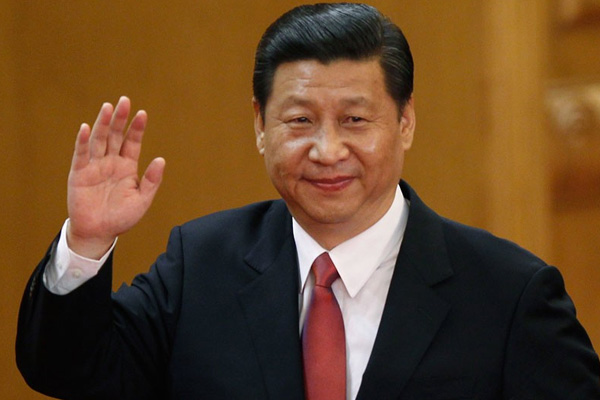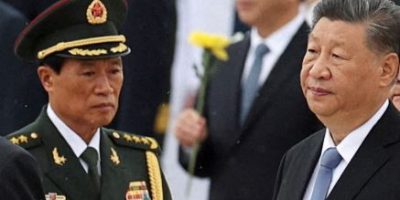Chinese Premier Li Keqiang hints at broader China, US cooperation

ISLAMBAD, MAR 15 (DNA) -Premier Li Keqiang met reporters from home and abroad at a news conference on Wednesday at the end of the annual meeting of the National People’s Congress. Premier Li answered questions on various topics such as the economy, financial reforms and diplomacy. Here are highlights of the event.
China-US relations
The One-China policy constitutes the political foundation of China-US relations which has remained unshaken despite the changing circumstances, nor can this relationship be undermined. “With that foundation in place, we believe that there are broad prospects for China-US cooperation.”
Diplomats from the two countries are already engaged in discussing a face-to-face meeting between the Chinese and US presidents. “I believe it is important for both countries to uphold strategic interests, sit down to talk to each other so as to enhance mutual understanding and trust.”
US companies will be the first to suffer if the US and China have a trade war. Bilateral investment and trade had created nearly one million jobs for the US, and that the two nations should look and move forward despite challenges in the ties.
Financial risks
There will not be eruption of systematic financial crisis in China and it has many policy tools available to resolve financial risks. “Once we find financial risks, we will tackle it promptly to prevent it from worsening.”
China’s GDP growth target for this year, which is “around 6.5 percent”, is not low given China’s already big economic scale and it would not be easy for China to achieve the target.
China contributed about 30 percent of global growth in 2016 and China will remain an important contributor of global economic growth this year.
Economic growth
There is little risk of a hard landing for the Chinese economy, because the country’s healthy economic transformation process relies mainly on industrial upgrades.
China has, for years, achieved medium to high growth, thanks to achievements made in consumption and industrial upgrades.
China will not adopt mass stimulus measures but will continue to fuel growth momentum through deepening reform.
Regional trade agreements
China always takes an open attitude to various regional trade agreements, and the country will seize any possible opportunity to improve the world economy through multilateral trading system.
But China will not overreach its regional influence to seek trade arrangements where the country’s due role is not in place.
Streamlining administration and delegating power
China will continue to lower market thresholds and create an environment of fair competition.
“We have the resilience to (push forward the streamlining) no matter what kind of problems or resistance we encounter.”
Governments at all levels should integrate administrative services with the internet to make life easier for the public as well as encourage “law-abiding market entities” and give a green light to entrepreneurs and innovators.
Employment
The Chinese government will not allow massive unemployment, and China’s economy is projected to see steady growth without the likelihood of a hard landing.
“A close look at the Government Work Report will show that we have set higher targets in 2017 for all major areas of economic and social development, which includes creating 1 million more urban jobs than in 2016.”
“Employment is of paramount significance for such a large country as China, which has more than 1.3 billion people. Employment is the foundation of economic development.”
For the past four years, China has been creating 13 million urban jobs a year, which has helped the country keep unemployment at a fairly low level.
Made in China 2025
Made in China 2025 is to enhance the quality of products, better meet consumers’ demands, and constitutes an important part of the supply-side structural reform.
But the plan will never lead to reducing imports and retreating from further opening-up.
Mass entrepreneurship and innovation
China’s 800 million-strong labor force, among whom 170 million received higher education and training in professional skills, is a tremendous source to generate enormous market opportunities for both China and the world.
The government should create a good environment to promote business startups and innovation and for Chinese people to make the best of their intelligence.
Mass entrepreneurship and innovation has not only brought many job opportunities, but also created many modes of business, including the sharing economy and Internet Plus.
Exchange rate
China has ample foreign exchange reserves to satisfy the demands of imports and short-term debt repayments.
China does not want to resort to yuan depreciation to boost exports as that would dampen the restructuring and upgrading of the corporate sector.
“We also do not want any trade war with others and we have stuck to reform of the yuan’s exchange rate formation mechanism to keep it basically stable at reasonable and equilibrium levels.” More
Laid-off workers
Helping laid-off workers find new jobs is the most important issue for China as it works to reduce industrial overcapacity.
Last year, the central government set up a 100 billion yuan ($14.4 billion) fund to help workers and also asked local governments to set up similar funds. Assistance has already been provided to 720,000 laid-off workers.
Efforts to cut overcapacity will be extended this year to coal-fired power generation. Together with the people who are still to be re-employed from 2016, China will need to help about 1 million workers this year.
The key is to continue generating jobs. Thanks to the initiative of massive entrepreneurship and innovation, many jobs have been created, while traditional drivers of growth have been upgraded, which is also generating job opportunities.
Asia-Pacific region
Premier Li hopes cooperation between China and the United States in the Asia-Pacific region will bring opportunities to ASEAN countries, instead of trouble.
China does not want to see any party in the Asia-Pacific region feel compelled to choose sides under the influence of a Cold-War mentality.
The Asia-Pacific is the common home of all countries in the region, and China believes regional affairs should be decided and handled on the merits of each case.
Air pollution
New special fund will bring together top scientists to tackle smog. “Blue skies will not be, and should not be, a luxury.”
China will take firm steps to address coal consumption, vehicle exhaust emissions and dust.
Related News

More than 3,000 migrants died while trying to reach Spain
DNA MADRID: More than 3,000 migrants died while trying to reach Spain this year, aRead More

Chinese Communist Party expels top generals
News Desk BEIJING: The Chinese Communist Party has expelled nine top generals in one ofRead More


Comments are Closed